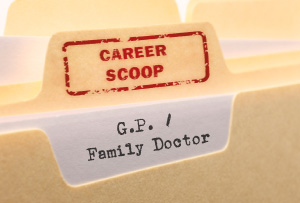Career Insight: G.P. / Family Doctor
In a nutshell, what do you do?
In a typical day I’ll spend about 6 – 7 hours seeing patients: listening, examining, diagnosing, prescribing, investigating, advising or otherwise problem-solving. The other 3 – 4 hrs is spent on the administrative side: writing referral letters, dealing with results, completing forms, writing reports, liaising with colleagues and more problem-solving.
Then there is out of hours work, about one shift a month, and a lot of reading and educational meetings to keep up to date.
Why did you choose this career?
I decided at the age of about 10 that I wanted to be a Dr, because I thought people would always need doctors no matter what – my first memory of thinking about it is deciding I’d like to go into space, but didn’t want to be an ordinary astronaut – I knew they would always have a Dr on space missions. A few years later I got interested in psychiatry because I thought the study of the mind was fascinating.
What path did you take into it?
I knew I would have to get good grades, so studied hard at school, and applied to universities that had good reputations. At interview, when asked the usual question of why I wanted to be a doctor (it was drilled into us that we had to answer something other than “I want to help people”) I said I wanted to be a psychiatrist. At this point I knew nothing about what it actually involved.
After finishing medical school and starting work, I decided I was too young to go straight into psychiatric training, so elected to do the GP training scheme to get a range of medical experience. After a few weeks working in General Practice I realised I had no desire to go back to working in hospitals and that there was plenty of mental illness in GP to keep me interested, as well as the variety of everything else. I had done a six month psychiatry rotation as part of the GP training, and found I didn’t enjoy the reality of it at all.
What, in your opinion, is the best bit of being a GP?
The flexibility of being able to chose where to work, how much, and whenever I’ve wanted. There are shortages of GPs everywhere so you will always be able to find work, anywhere in the world, and you don’t have to work full-time, nor is there a lot of on-call.
I like the variety of never knowing what will be coming through my door next, so get to deal with all sorts of things, and I like the continuity of getting to know patients and their families over the years, as well as being able to find out what happens to people through their illnesses, which often doesn’t happen in hospital specialties.
Every job has its downsides. What do you think are the worst bits?
GPs earn a lot less than hospital Drs, even if they work full-time; there is a lot of paperwork and you have to see a lot of routine conditions, which wouldn’t interest everyone. You get no choice in who you see; there are patients you can’t escape no matter how difficult you find them.
Because there are shortages of locums, it’s hard covering holidays, and being a partner means having to run a business and be an employer, which you get no training for, and is frustrating and not well rewarded. There are increasing government targets to be met, and endless demands on your time.
Is it what you expected when you first started out – and what’s different?
At the start of my career, I wanted to be a professor of psychiatry, with the prestige, the income and the private practice; now I’m a part-time GP in a small practice and part-owner of a business. I’m not interested in the academic side of medicine now, don’t care about status, and am very happy not to be working in the hospital system.
What do the public least understand – or mistake – about what you do?
They have no idea of all the unpaid overtime I have to do just to keep up, and seem to think I earn a lot more than in reality. People have very unrealistic ideas of what modern medicine can do for them, and of the limitations of a public health service.
What kind of people tend to do well? (skills, strengths, values, personality)
To survive medical school and a career in medicine, you have to be well-organised, a little bit OCD (obsessive compulsive), a little bit arrogant – which is the other side of self-belief – hard-working, able to see the long-term goal, resilient, flexible, self-less, and in GP you absolutely have to like people in general, and be able to work as part of a team.
Finally, any advice you’d offer to people looking to get into this line of work?
Talk to as many GPs as you can in your area to find out the realities of the job and whether it will suit your personality and aspirations. Get as much life-experience as you can before you start – travel, do some other jobs first. Don’t expect it to be easy.
Want more information on a career in medicine? Visit My Health Career…




